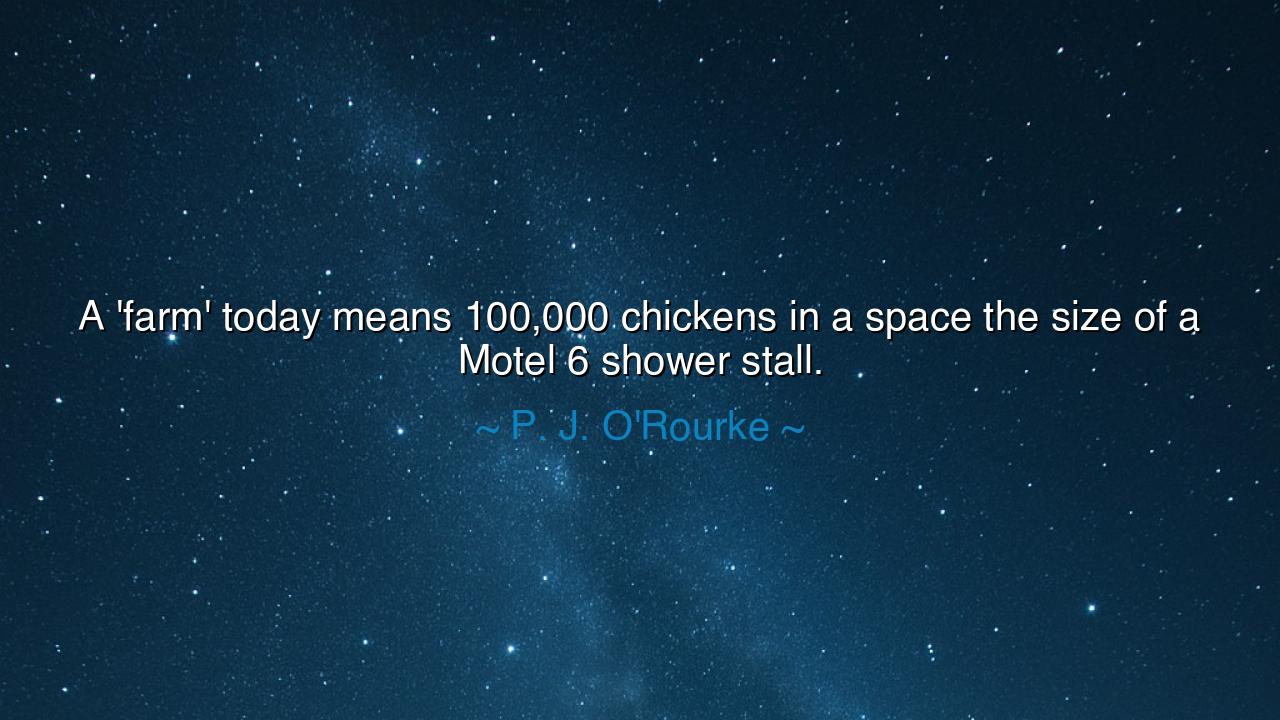
A 'farm' today means 100,000 chickens in a space the size of a






Hear, O seekers of truth, the piercing words of P. J. O’Rourke: “A ‘farm’ today means 100,000 chickens in a space the size of a Motel 6 shower stall.” Though spoken with satire, this saying strikes like a lament of the prophets, for it reveals the distance between what once was and what now is. The farm, once a place of open fields and living rhythms, has been reshaped into a machine of confinement, where creatures are counted not as lives but as numbers, and where abundance is purchased at the price of dignity.
The meaning is layered. On the surface, O’Rourke points to the crowding of animals in industrial agriculture, where efficiency tramples mercy. The image of 100,000 chickens packed into a space unfit even for one human body shocks the mind, yet it is no exaggeration of the cruelty that has become commonplace. Beneath the humor lies sorrow, for mankind, in pursuit of profit, has reshaped the farm—once a symbol of simplicity and harmony with the earth—into an emblem of excess and estrangement.
The origin of this truth lies in the shift from traditional husbandry to industrial farming. For centuries, the farm was small, a family’s labor spread upon the land. Animals roamed, crops followed the seasons, and life was bound to the soil in a sacred cycle. But in the modern age, machines and markets demanded more. The farm became factory, the animal became unit, and the natural rhythms were replaced by steel cages and fluorescent lights. Thus, O’Rourke’s image is both biting and accurate: what once symbolized life now often reeks of oppression.
History, too, warns us of this danger. In ancient Rome, small farmers tilled their fields with pride, but as the empire grew, vast latifundia—plantations worked by slaves—devoured their lands. The dignity of farming was lost, replaced by the greed of mass production. Rome fed its people, yes, but the cost was inequality, unrest, and eventual decay. So too today, the factory farm may fill shelves with cheap abundance, but it does so by eroding both the earth and the spirit of humanity.
Yet there is also hope, for some have resisted this path. Consider the rise of those who return to smaller, sustainable farming, who choose open pastures over cages, who honor the life of the chicken, the cow, the soil itself. These are not merely farmers but guardians of an ancient covenant: that man, though master of the earth, must also be its steward. Their labor is harder, their profit smaller, yet their conscience remains unshackled, and their harvest blesses rather than curses.
The lesson for us is clear: do not be deceived by the abundance of the market without asking the cost of its plenty. Every purchase is a vote, every meal a choice. To honor life is to look beyond the package to the suffering or freedom it represents. To feed ourselves rightly, we must not only nourish the body but also respect the sacred order of creation.
Therefore, O listener, let your actions be guided by awareness. Seek food that comes from farms, not factories. Support those who honor the soil and the creature, not those who confine them in spaces of torment. And in your own life, learn to resist the call of convenience when it comes at the expense of dignity. For to consume without thought is to participate in the chain of cruelty; but to choose wisely is to reclaim the ancient harmony between man, animal, and earth. In this way, you will not only feed yourself, but you will nourish justice, compassion, and the eternal covenant of life.






AAdministratorAdministrator
Welcome, honored guests. Please leave a comment, we will respond soon